DRS 411: Intellectual Disability Self-Assessment and Reflection Report
VerifiedAdded on 2020/04/29
|5
|960
|155
Homework Assignment
AI Summary
This assignment is a self-assessment and reflection on the student's learning experience in the DRS 411 course, focusing on intellectual disability. The student evaluated their engagement with lectures, readings, and peer discussions on Flinders learning, highlighting insights gained about myths, stereotypes, and the importance of cultural diversity. The student also discussed the National Disability Insurance Scheme (NDIS) and strategies for supporting individuals with intellectual disabilities, including teaching new skills to manage challenging behaviors. Despite some absences, the student reflects on their improved understanding of intellectual disability and their ability to support individuals and their families, aiming for a grade of 75% based on their participation.
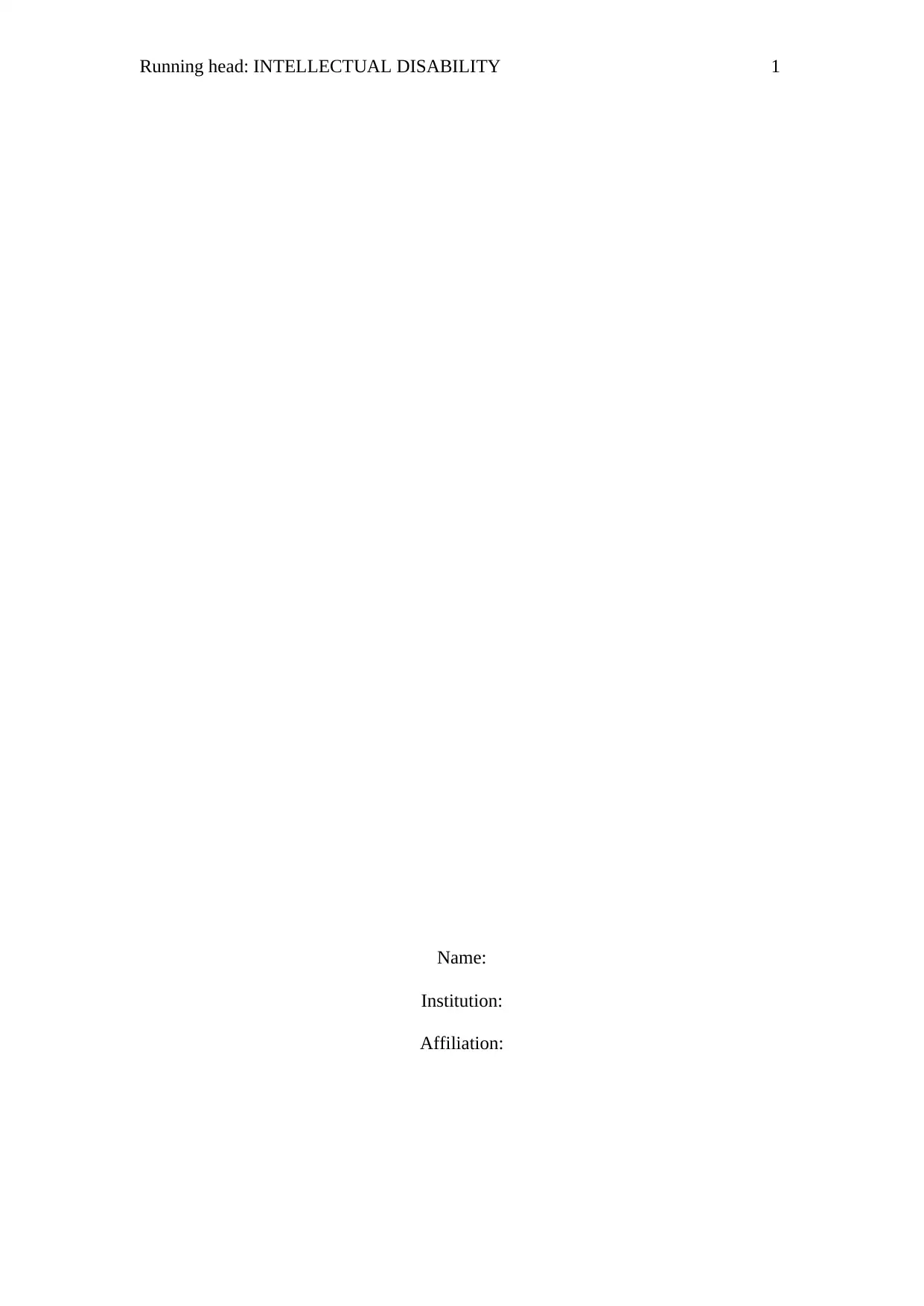
Running head: INTELLECTUAL DISABILITY 1
Name:
Institution:
Affiliation:
Name:
Institution:
Affiliation:
Paraphrase This Document
Need a fresh take? Get an instant paraphrase of this document with our AI Paraphraser
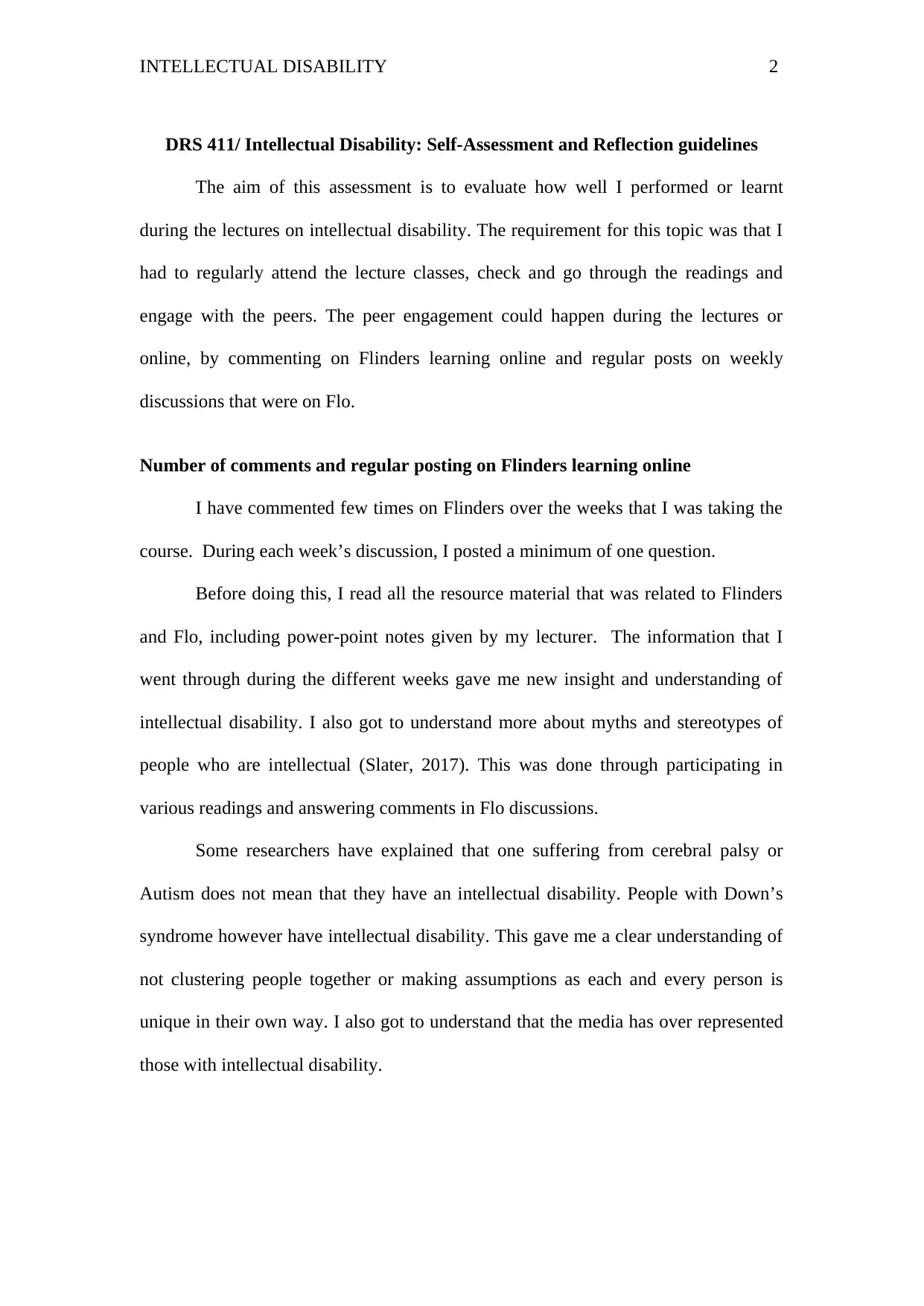
INTELLECTUAL DISABILITY 2
DRS 411/ Intellectual Disability: Self-Assessment and Reflection guidelines
The aim of this assessment is to evaluate how well I performed or learnt
during the lectures on intellectual disability. The requirement for this topic was that I
had to regularly attend the lecture classes, check and go through the readings and
engage with the peers. The peer engagement could happen during the lectures or
online, by commenting on Flinders learning online and regular posts on weekly
discussions that were on Flo.
Number of comments and regular posting on Flinders learning online
I have commented few times on Flinders over the weeks that I was taking the
course. During each week’s discussion, I posted a minimum of one question.
Before doing this, I read all the resource material that was related to Flinders
and Flo, including power-point notes given by my lecturer. The information that I
went through during the different weeks gave me new insight and understanding of
intellectual disability. I also got to understand more about myths and stereotypes of
people who are intellectual (Slater, 2017). This was done through participating in
various readings and answering comments in Flo discussions.
Some researchers have explained that one suffering from cerebral palsy or
Autism does not mean that they have an intellectual disability. People with Down’s
syndrome however have intellectual disability. This gave me a clear understanding of
not clustering people together or making assumptions as each and every person is
unique in their own way. I also got to understand that the media has over represented
those with intellectual disability.
DRS 411/ Intellectual Disability: Self-Assessment and Reflection guidelines
The aim of this assessment is to evaluate how well I performed or learnt
during the lectures on intellectual disability. The requirement for this topic was that I
had to regularly attend the lecture classes, check and go through the readings and
engage with the peers. The peer engagement could happen during the lectures or
online, by commenting on Flinders learning online and regular posts on weekly
discussions that were on Flo.
Number of comments and regular posting on Flinders learning online
I have commented few times on Flinders over the weeks that I was taking the
course. During each week’s discussion, I posted a minimum of one question.
Before doing this, I read all the resource material that was related to Flinders
and Flo, including power-point notes given by my lecturer. The information that I
went through during the different weeks gave me new insight and understanding of
intellectual disability. I also got to understand more about myths and stereotypes of
people who are intellectual (Slater, 2017). This was done through participating in
various readings and answering comments in Flo discussions.
Some researchers have explained that one suffering from cerebral palsy or
Autism does not mean that they have an intellectual disability. People with Down’s
syndrome however have intellectual disability. This gave me a clear understanding of
not clustering people together or making assumptions as each and every person is
unique in their own way. I also got to understand that the media has over represented
those with intellectual disability.
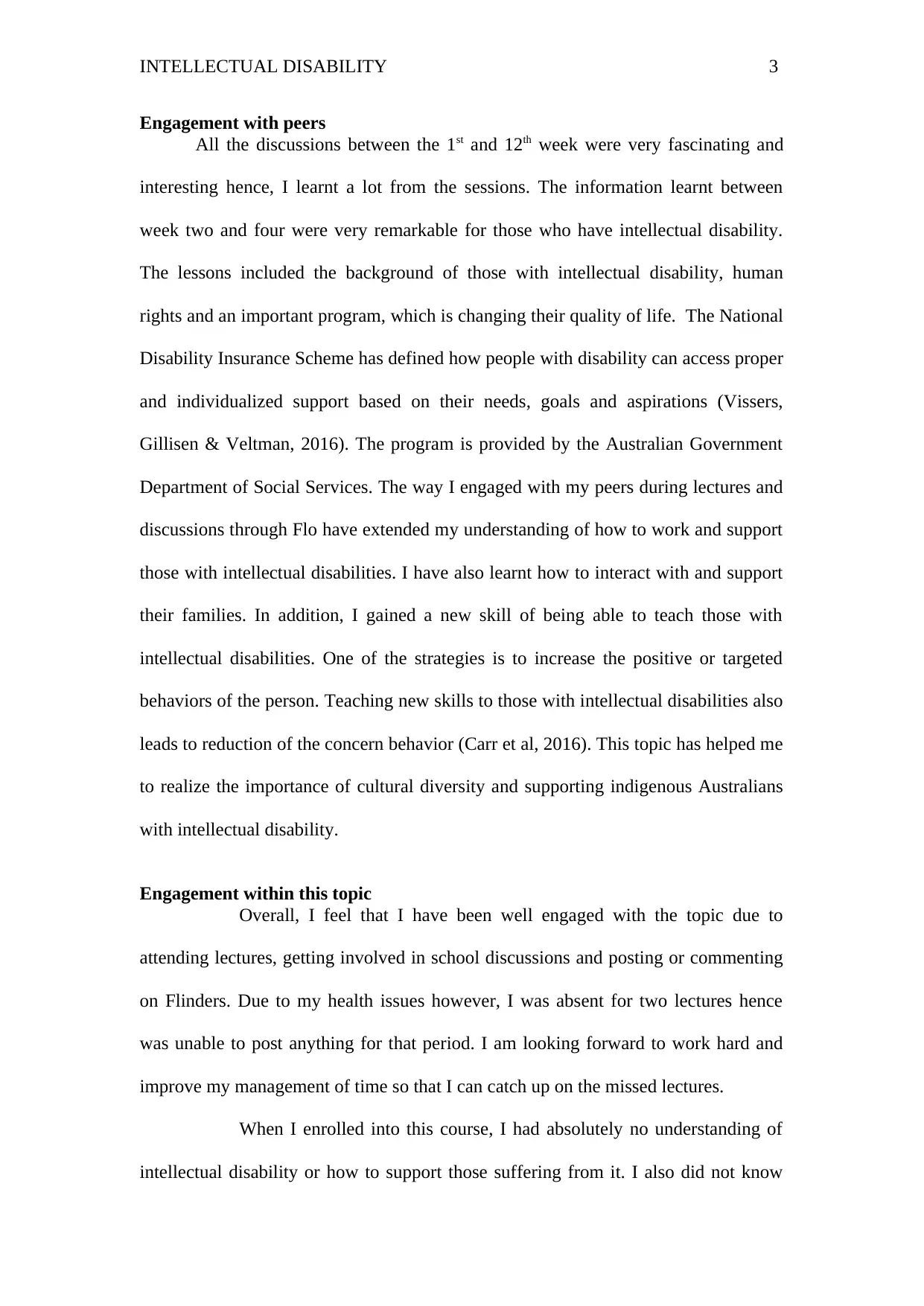
INTELLECTUAL DISABILITY 3
Engagement with peers
All the discussions between the 1st and 12th week were very fascinating and
interesting hence, I learnt a lot from the sessions. The information learnt between
week two and four were very remarkable for those who have intellectual disability.
The lessons included the background of those with intellectual disability, human
rights and an important program, which is changing their quality of life. The National
Disability Insurance Scheme has defined how people with disability can access proper
and individualized support based on their needs, goals and aspirations (Vissers,
Gillisen & Veltman, 2016). The program is provided by the Australian Government
Department of Social Services. The way I engaged with my peers during lectures and
discussions through Flo have extended my understanding of how to work and support
those with intellectual disabilities. I have also learnt how to interact with and support
their families. In addition, I gained a new skill of being able to teach those with
intellectual disabilities. One of the strategies is to increase the positive or targeted
behaviors of the person. Teaching new skills to those with intellectual disabilities also
leads to reduction of the concern behavior (Carr et al, 2016). This topic has helped me
to realize the importance of cultural diversity and supporting indigenous Australians
with intellectual disability.
Engagement within this topic
Overall, I feel that I have been well engaged with the topic due to
attending lectures, getting involved in school discussions and posting or commenting
on Flinders. Due to my health issues however, I was absent for two lectures hence
was unable to post anything for that period. I am looking forward to work hard and
improve my management of time so that I can catch up on the missed lectures.
When I enrolled into this course, I had absolutely no understanding of
intellectual disability or how to support those suffering from it. I also did not know
Engagement with peers
All the discussions between the 1st and 12th week were very fascinating and
interesting hence, I learnt a lot from the sessions. The information learnt between
week two and four were very remarkable for those who have intellectual disability.
The lessons included the background of those with intellectual disability, human
rights and an important program, which is changing their quality of life. The National
Disability Insurance Scheme has defined how people with disability can access proper
and individualized support based on their needs, goals and aspirations (Vissers,
Gillisen & Veltman, 2016). The program is provided by the Australian Government
Department of Social Services. The way I engaged with my peers during lectures and
discussions through Flo have extended my understanding of how to work and support
those with intellectual disabilities. I have also learnt how to interact with and support
their families. In addition, I gained a new skill of being able to teach those with
intellectual disabilities. One of the strategies is to increase the positive or targeted
behaviors of the person. Teaching new skills to those with intellectual disabilities also
leads to reduction of the concern behavior (Carr et al, 2016). This topic has helped me
to realize the importance of cultural diversity and supporting indigenous Australians
with intellectual disability.
Engagement within this topic
Overall, I feel that I have been well engaged with the topic due to
attending lectures, getting involved in school discussions and posting or commenting
on Flinders. Due to my health issues however, I was absent for two lectures hence
was unable to post anything for that period. I am looking forward to work hard and
improve my management of time so that I can catch up on the missed lectures.
When I enrolled into this course, I had absolutely no understanding of
intellectual disability or how to support those suffering from it. I also did not know
⊘ This is a preview!⊘
Do you want full access?
Subscribe today to unlock all pages.

Trusted by 1+ million students worldwide
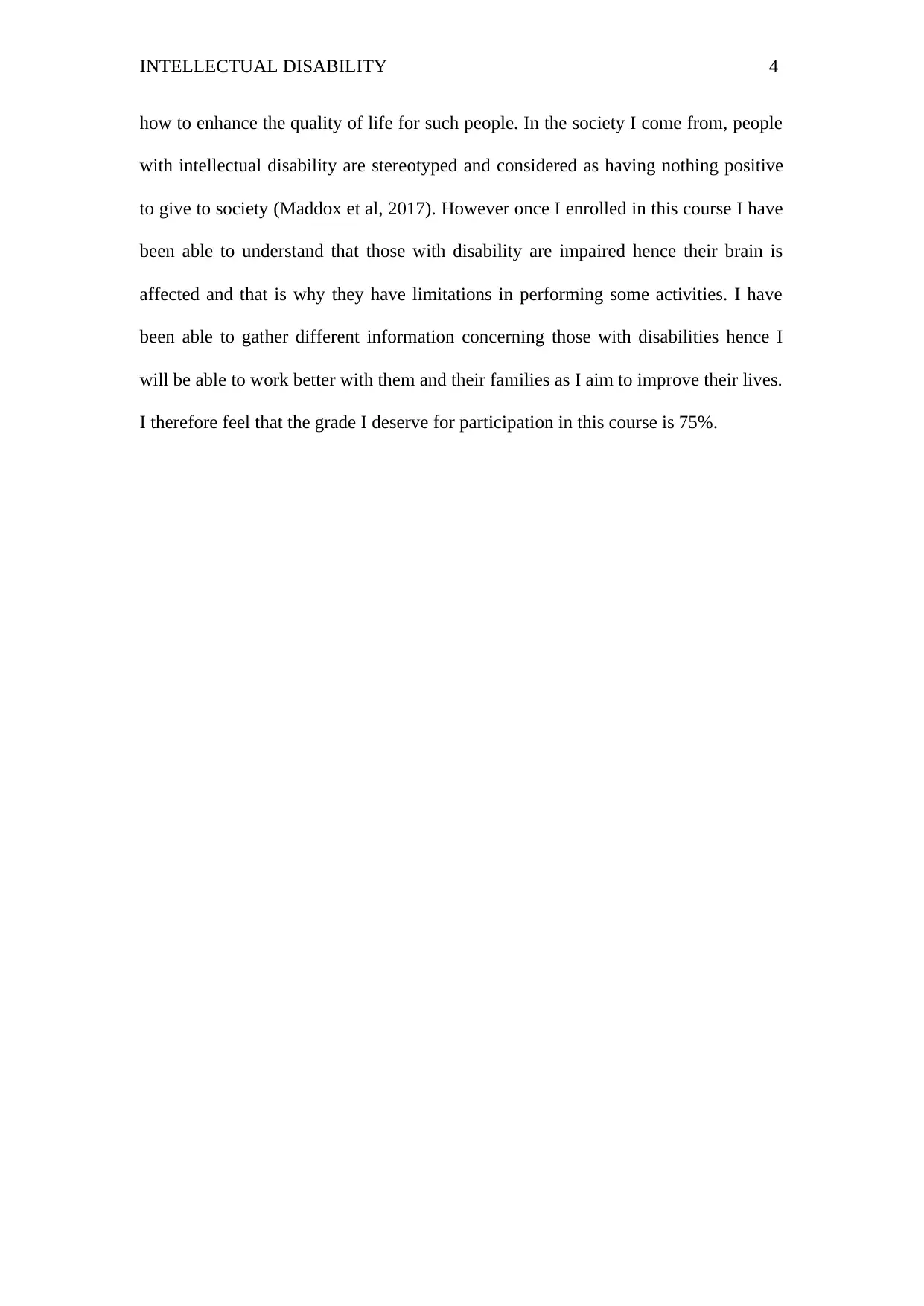
INTELLECTUAL DISABILITY 4
how to enhance the quality of life for such people. In the society I come from, people
with intellectual disability are stereotyped and considered as having nothing positive
to give to society (Maddox et al, 2017). However once I enrolled in this course I have
been able to understand that those with disability are impaired hence their brain is
affected and that is why they have limitations in performing some activities. I have
been able to gather different information concerning those with disabilities hence I
will be able to work better with them and their families as I aim to improve their lives.
I therefore feel that the grade I deserve for participation in this course is 75%.
how to enhance the quality of life for such people. In the society I come from, people
with intellectual disability are stereotyped and considered as having nothing positive
to give to society (Maddox et al, 2017). However once I enrolled in this course I have
been able to understand that those with disability are impaired hence their brain is
affected and that is why they have limitations in performing some activities. I have
been able to gather different information concerning those with disabilities hence I
will be able to work better with them and their families as I aim to improve their lives.
I therefore feel that the grade I deserve for participation in this course is 75%.
Paraphrase This Document
Need a fresh take? Get an instant paraphrase of this document with our AI Paraphraser
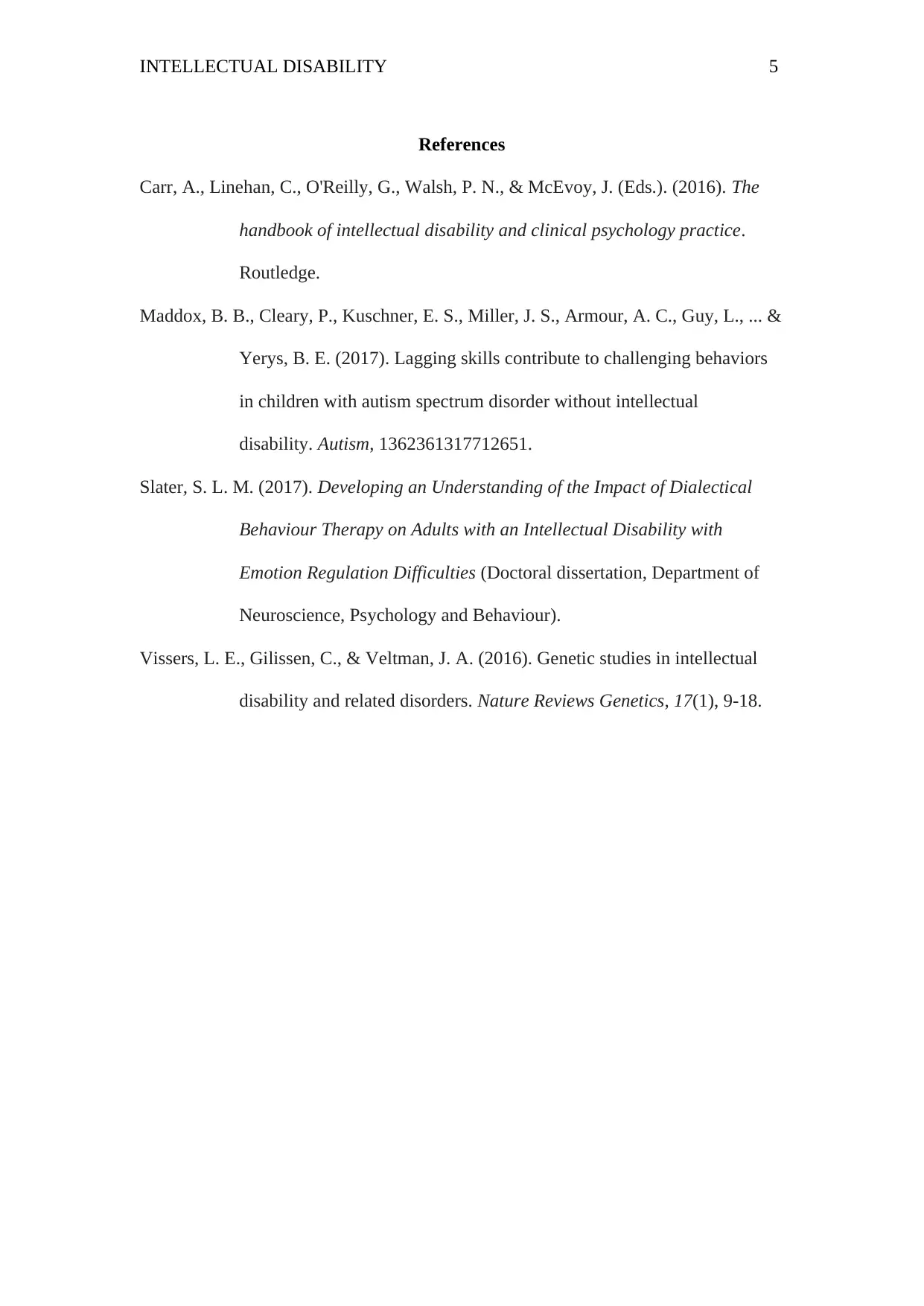
INTELLECTUAL DISABILITY 5
References
Carr, A., Linehan, C., O'Reilly, G., Walsh, P. N., & McEvoy, J. (Eds.). (2016). The
handbook of intellectual disability and clinical psychology practice.
Routledge.
Maddox, B. B., Cleary, P., Kuschner, E. S., Miller, J. S., Armour, A. C., Guy, L., ... &
Yerys, B. E. (2017). Lagging skills contribute to challenging behaviors
in children with autism spectrum disorder without intellectual
disability. Autism, 1362361317712651.
Slater, S. L. M. (2017). Developing an Understanding of the Impact of Dialectical
Behaviour Therapy on Adults with an Intellectual Disability with
Emotion Regulation Difficulties (Doctoral dissertation, Department of
Neuroscience, Psychology and Behaviour).
Vissers, L. E., Gilissen, C., & Veltman, J. A. (2016). Genetic studies in intellectual
disability and related disorders. Nature Reviews Genetics, 17(1), 9-18.
References
Carr, A., Linehan, C., O'Reilly, G., Walsh, P. N., & McEvoy, J. (Eds.). (2016). The
handbook of intellectual disability and clinical psychology practice.
Routledge.
Maddox, B. B., Cleary, P., Kuschner, E. S., Miller, J. S., Armour, A. C., Guy, L., ... &
Yerys, B. E. (2017). Lagging skills contribute to challenging behaviors
in children with autism spectrum disorder without intellectual
disability. Autism, 1362361317712651.
Slater, S. L. M. (2017). Developing an Understanding of the Impact of Dialectical
Behaviour Therapy on Adults with an Intellectual Disability with
Emotion Regulation Difficulties (Doctoral dissertation, Department of
Neuroscience, Psychology and Behaviour).
Vissers, L. E., Gilissen, C., & Veltman, J. A. (2016). Genetic studies in intellectual
disability and related disorders. Nature Reviews Genetics, 17(1), 9-18.
1 out of 5
Related Documents
Your All-in-One AI-Powered Toolkit for Academic Success.
+13062052269
info@desklib.com
Available 24*7 on WhatsApp / Email
![[object Object]](/_next/static/media/star-bottom.7253800d.svg)
Unlock your academic potential
Copyright © 2020–2025 A2Z Services. All Rights Reserved. Developed and managed by ZUCOL.





